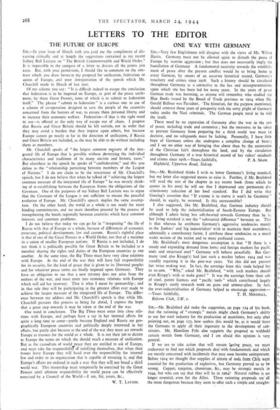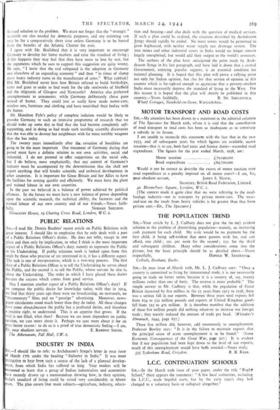Brailsford did make the suggestion, on page 124 of his
book, that the rationing of " strategic " metals might check Germany's ability to use her steel industry for the production of munitions, but only after pointing out, on page 123, how useless this would be, as it would force the Germans to apply all their ingenuity to the development of sub- stitutes. Mr. Hamilton Fyfe also supports the proposal to withhold certain metals from Germany, and I am afraid this opinion is very general.
If we are to take action that will ensure lasting peace, we must endeavour to find out which proposals deal with fundamentals and which are merely concerned with incidentals that may soon become unimportant. Before 1914 we thought that supplies of nitrate of soda from Chile wen essential for the production of explosives, but Germany proved us to be wrong. Copper, tungsten, chromium, &c., may be strategic metals in 1944, but who can say that they will be in 1964? Natural rubber is no longer essential, even for the Allies. These rationing proposals are" all the more dangerous because they seem to offer such a simple and straight-
forward solution to the problem. We must not forget that the " strategic " materials are also needed for domestic purposes, and any rationing can only be for a comparatively short time unless Germany is to be barred from the benefits of the Atlantic Chaiter for ever.
I agree with Mr. Brailsford that it is very important to encourage Germany to develop her home markets and raise the standard of living ; if this happens they may feel that they have more to lose by war, but the arguments which he uses to support this suggestion are quite wrong. He says, " I insist that the real safeguard is the adoption in Germany end elsewhere of an expanding economy " and then " in times of slump every heavy industry turns to the manufacture of arms." What rubbish! Did Mr. Brailsford never hear how Britain refused to build battleships, tanks and guns in order to find work for the idle steelworks of Sheffield and the shipyards of Glasgow and Newcastle? America also preferred unemployment to armaments, while Germany deliberately chose guns Instead of butter. They could just as easily have made motor-cars, wireless sets, furniture and clothing and have nourished their bodies with the butter.
Mr. Hamilton Fyfe's policy of complete isolation would be likely to provoke Germany to such an intensive programme of research that we should wake up some day to find that she had become completely self- supporting, and in doing so had made such startling scientific discoveries that she was able to destroy her neighbours with far more terrible weapons than she has today.
The twenty years immediately after the.. cessation of hostilities are going to be the most important Our treatment of Germany during that period must have a definite relation to our own activities, social and industrial. I do not pretend to offer suggestions on the social side, but I do believe, most emphatically, that any control of Germany's industry must be accompanied by the determination that she shall not export anything that will hinder scientific and technical development in other countries. It is important for Great Britain and her Allies to have the facilities for arming quickly and efficiently. We must have the plant and trained labour in our own countries.
In the past we believed in a balance of power achieved by political alliances. In the future we must have a new balance of power depending upon the scientific research, the technical ability, the factories and the trained labour of our own country and of our friends.—Yours faith-



























 Previous page
Previous page